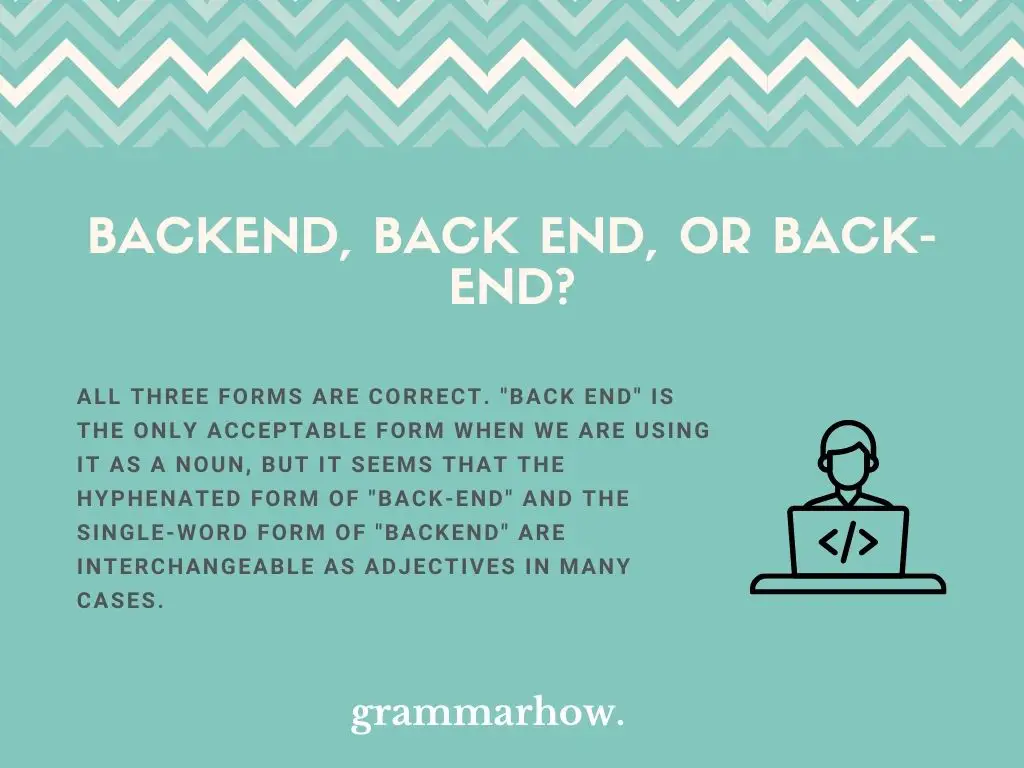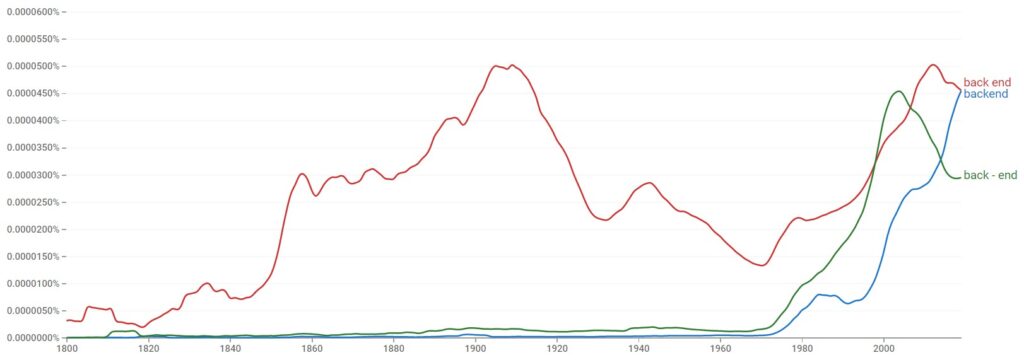When learning about how the “back end” of systems works, a lot more goes into it than you first think. But before any of that, it would also help to learn how to spell it. This article will demonstrate when it’s one or two words (and when it’s hyphenated).
Back end vs. Back-end vs. Backend
It’s most common for “back end” to be used as two words. In this form, it’s a noun, and we can use it to refer to what happens on the back end of a computer system. We might find that it’s correct when hyphenated, but only as an adjective.

According to Google Ngram Viewer, “back end” is the most popular choice. However, “backend” also seems to be popular as a one-word option, but this does not work in any written cases.

Informally, “backend” might work well, since many people like to drop hyphens when they do not aid readability. However, officially, we should always write “back-end” with a hyphen. While the graph doesn’t reflect this, try to remember this fact in your writing.
The Cambridge Dictionary and The Oxford Dictionary only provide entries for “back end” and “back-end.” Since both dictionaries mention both forms (and do not mention “backend” as one word), it makes sense that we should stick to these official definitions when writing.
“Backend” should be disregarded, since it is not officially recognized by either The Cambridge Dictionary or The Oxford Dictionary.
Here’s the difference between the adjective and noun forms that you might need to know about:
- Adjective: I’m going to become a back-end developer
- Noun: He should be sorting out the back end for us.
Is “Backend” One Word?
“Backend” is never correct, and you should avoid using it. While it seems some people like to drop the hyphen in writing, it is not correct to do so. Some rules allow us to change hyphens in some cases, but these cases do not apply to “backend.”
Here are a few examples that will help you understand it:
- Correct: I’m going to need to look into the back-end system before helping you with this.
- Incorrect: The backend developer should be along shortly. Just be patient.
- Correct: We’ll have to get the back-end diagnosis before we can do anything that will affect this negatively.
- Incorrect: It’s the backend problem that’s the most worrying. It needs to be fixed ASAP.
Is “Back end” Two Words?
“Back end” is used as a phrasal noun. In this way, we can use “back” to modify “end,” and the two words are commonly used together as a standalone noun that can be modified further in a sentence. It’s common for this form to be present in English.
Check out some of these examples to see how it works:
- I’m going to check out the back end to see if I can spot anything wrong with it.
- The back end is where most of the work goes in, so you can check it out yourself.
- I’d like to be more involved in the back end. Do you think I could have training?
- We’re going to need to open up the back end before determining what’s wrong here.
Is “Back-end” Hyphenated?
“Back-end” should be hyphenated as an adjective. We write it in this form because it stays truer to English rules that allow us to create compound adjectives. These rules apply when more than one word modifies the same noun in a sentence.
AP Style rules allow us to hyphenate multiple words when those words modify a noun. Typically, the noun will come directly after the word “Back-end,” which helps us to make the modification clearer.
Check these examples out to give you a better feel for it:
- I’m going to need a back-end web developer before diving into this.
- The back-end developer didn’t know what he was doing! It was ridiculous.
- You’re not the back-end programmer that I asked for! Please find me someone that can actually help.
- I’ll be the back-end analyzer if that will help you?
Is “End” Capitalized In The Word “Back-End”?
There is no reason to capitalize “end” in “back-end.” The hyphen allows us to treat the words as one form, which means only “Back” will be capitalized if we start a sentence with it.
However, if we include it in a title, then “Back-End” might be more suitable as two capitalized words. This will help it stay more in line with the rest of the title, which will make your writing look much better overall.

Martin holds a Master’s degree in Finance and International Business. He has six years of experience in professional communication with clients, executives, and colleagues. Furthermore, he has teaching experience from Aarhus University. Martin has been featured as an expert in communication and teaching on Forbes and Shopify. Read more about Martin here.
